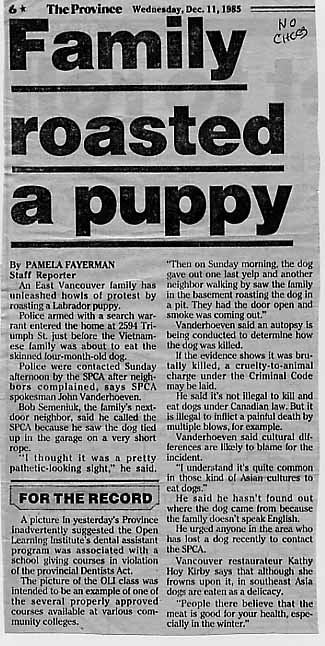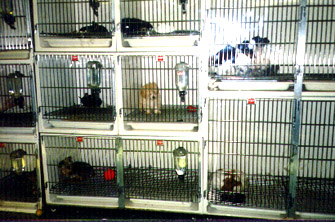WHY HASN’T
THE SPCA EVER HAD LEGISLATION ENACTED TO PREVENT THESE CRUELTIES?
Who are they really speaking for? – Why
do they remain so silent?
Nicholas Read, columnist, The Sun, January 7, 1995: "Why?
Why is it that during the more than three years I‘ve been writing this column, and
long before that, I never heard the BC SPCA speak out about anything? While the Vancouver
Humane Society was leading the charge to ban exotic-animal performances in circuses; while
Mercy Volunteers for Animals was winning a fight to ban the seizure of pound animals to be
used in experiments; while Meow Aid was urging city councils in Burnaby and New
Westminster to pass spay/neuter legislation; while the Rainforest Reptile Refuge was at
the forefront of a campaign to stop the sale of exotic animals in pet shops; while Bear
Watch was filling our TV screens with the ugliness of hunting; while Canadians for the
Ethical Treatment of Food Animals fought the biggest battle of all – the battle on
behalf of farm animals – the BC SPCA said nothing. Nothing at all."
(AAS: And Animal Advocates Society was
getting laws passed to stop the inhumanity of the chained dog’s life, and
Lifeforce Foundation was getting the dreadful Stanley Park Zoo closed, and
Pets in Need was paying hundreds of thousands of dollars to spay and neuter
pets for people who were turned away from the SPCA clinic.)
BREEDING
In 100 years of "caring", to the best of our knowledge,
the SPCA has never tried to control breeding of cats and dogs. Could that be because some
staff and directors breed and sell animals?
Why doesn’t the SPCA tell its staff to stop breeding and selling animals?
Read about the the SPCA's
pound contracting
empire
| EATING
DOGS AND CATS Why hasn’t the SPCA ever asked for legislation to prevent the
killing and eating of dogs and cats in B.C.? They know this is going on; they’ve had
to investigate when horrified neighbours have reported this to them. Other countries have
risked offending. Even Russia. But not in B.C. Not even after the public outcry to do
something that this story in 1985 raised. The public and the media soon forget.
That’s what has protected the SPCA from scrutiny all these years. John van der Hoeven
is still, in 2001, the man who decides what cruelty gets investigated and what doesn't
even though the BC SPCA has said it will "raise the bar" on prosecutions.
And Yes, AAS has been told that dogs are still being eaten in Vancouver. AAS welcomes a
diversity of cultural differences as long as they are benign. The SPCA has repeatedly
excused cruel cultural practices by using the "cultural differences" taboo, as
though there are permitted cultural differences even if they are cruel. (See
Turtles, below.)
|
 |
 |
PET STORE PUPS
Read AAS's proposal
to get suffering pups out of
isolation in cruel cages
Why hasn’t the SPCA ever asked for Pet Store regulations to stop the cruel way animals are
caged and neglected? Why has it been up to Animal Advocates Society, with its tiny budget,
to do that? The SPCA, with an 20 million dollar budget, is called constantly by people
angry, offended, and very upset, at puppy-mill pups kept for months in isolation, in tiny
cages that have painful metal rack bottoms, until sold for prices as high as $1500, some
being held so long that they become cramped and stooped. Why has the SPCA called these
complaints "trivial"?
|
ANIMALS IN PRISON ZOOS, TANKS, AND
CAGES:
Why has the SPCA only spoken (carefully) against circuses,
whale-show businesses, and zoos, and then only after much pressure from ex-Sun columnist,
Nicholas Read, and the pressure of the little true animal welfare groups getting the
legislation passed. Who do they wish to avoid offending? And why?
LEG HOLD TRAPS
Why did the SPCA say that leg-hold traps are now humane, because
they have been slightly modified with padding? The animals are still dying slowly,
painfully, by drowning, by starvation, prey to predators. How is it that an organization
that collects money for claiming to protect animals from cruelty, has policies that
reflect gross indifference to animal-suffering?
ANIMALS IN RESEARCH LABS "WELFARE"
COMMITTEE:
The SPCA recently boasted that they do "animal welfare"
while the alternative network are just "animal activists". Here is their idea of
compassionate caring for animals: they are part of a committee that rubber-stamps the use
of animals in research at UBC. This committee has a vested interest in maintaining the
lucrative business of research grants, and in hiding what they do from the public. The
society that claims to speak for those who cannot speak for themselves, remains silent on
what they see in these labs. They will not say. Do they get paid for this service? They
will not say. |
|
LIVE ASIAN MARKET SALES OF TURTLES
Why has the SPCA never tried to ban the live chopping up of
turtles in Asian markets? Why did they tell so many complainants that there was ‘no
law being broken’, even though the provincial "Prevention of Cruelty to
Animals" act allows the SPCA itself to define cruelty and neglect? Here is what a
group of schoolchildren saw in Vancouver’s Chinatown: "A turtle cut to pieces
before their eyes…the shell removed while the turtle is still struggling and alive.
It is a horrifying sight." (Nicholas Read, Sun, Jan13/98) The children called the
SPCA. Months later the SPCA still had not called them back. Finally, under the pressure of
more columns by Read, the SPCA drafted "guidelines" which must be followed in
order for the seller to be given the permit to sell by the Conservation Branch of the
Environment Ministry. Guidelines include room to move, water to cover, dry
"sitting" area. But this cruelty goes on unabated. And it is reported to
the SPCA. Their answer? "It’s a cultural thing, there’s no law against
it." Yes - there is no law against it, but has the SPCA ever asked the provincial
government for a law against this? "Guidelines" are not law.
Guidelines need not be enforced. But guidelines can be used to "prove" the
SPCA has done something. Have they ever tried to use their guidelines? Why do they not try
to get a merchant’s permit revoked as an example to them all?
From the National Post, December 22/01: "A
fishmonger in Helsinki was fined for allowing turbot to suffer unnecessary pain while on
sale." Go to Vancouver's Chinatown anytime to see what pain the SPCA calls
"cultural differences". |
 |
|
CAT OVERPOPULATION CONTROL
AAS's humane solution to the problem of
"TOO MANY
CATS"
After years of blocking and stonewalling legislation
to help reduce the cat carnage caused by overpopulation; of refusing to help, or of even
acknowledging the struggling and impoverished cat rescue network, the SPCA was suddenly
front and centre taking credit when a coalition of cat groups got Surrey and Coquitlam to
adopt mandatory spay/neuter bylaws. Why? Could it be because the groups had allowed
the inclusion of a section that permitted "round up and kill" of all feral cats,
and most stray cats, and here was an opportunity for the SPCA to add cat control to their
eighteen dog control pound contracts in the lower mainland, and therefore boost their
contract prices? Port Moody recognized that possibility. Or was it the chance to shut down
the no-kill cat rescue network by forcing the rescuers to take cats to the SPCA/Pound, to
be killed? After all, the cat rescue network may drain away as much as a quarter of a
million dollars a year in donations, and they make the SPCA look bad. Or was it both?
|
THE SPCA RAID ON MADALYNN GILMORE Nicholas Read, Vancouver Sun, March 2, 1999 - SPCA tries to shut
down cat-rescuer Madalyn Gilmore
The SPCA’s relationship with other
animal organizations has not always been an easy one. SPCA involvement is essential to
getting progressive legislation enacted, but because the SPCA has always been so reluctant
to speak out on any issue, that involvement has rarely been forthcoming. Thus its
vociferous support for spay/neuter campaigns is a welcome surprise.
Nevertheless, the unease
remains. Late last month, a Langley inspector turned up unexpectedly at the Aldergrove
home of Madalynn Gilmore to warn her against taking in strays. Gilmore has been rescuing
cats and other animals for 20 years, putting everything she has into finding them good
homes. It doesn’t matter how sick the animal is when it arrives, Gilmore takes
responsibility for the vet bills, as well as the injections and the spaying or neutering.
A single cat can cost her hundreds of dollars to care for
Yet here was the SPCA telling her that after 20
years, it wasn’t legal for her to pick up strays and “sell” them anymore.
Animals are considered property under Canadian law. Therefore only the SPCA and municipal
pounds have the authority to pick up strays and release them to new owners.
Granted, but Gilmore always
notifies the SPCA of every stray she collects. Also, only five per cent of stray cats
picked up by the SPCA are returned to owners. Strays left on the street are strays left to
die.
Brian Nelson, SPCA director
of field operations, says the inspector was only doing his job, and had no intention of
harassing Gilmore.
Perhaps, but Lisa Borsato, a
woman who had brought in a cat for Gilmore to look after, told me: “He made it seem
like she was a criminal.”
Whatever the truth, it’s
not an image the SPCA can afford to have – that of the uncaring, rule-bound bully.
Not if it is going to win the trust it wants.
It has gone some distance to
ward shedding the image recently, but incidents like this don’t’ help.
If spay/neuter legislation
is going to work, it must not allow the SPCA to trouble people helping to solve the
problem. Not when there are still so many more people making it worse.
|
| Nicholas Read, January 7, 1995:
"I’ve been writing this column for a little more than three years
now, and I’ve received one press release from you. It was about a children’s
colouring contest. "That’s right, while other,
poorer, less well-known, and predominantly volunteer-driven groups were alerting me, and
the rest of the province to the horrors of veal crates and battery cages, of circuses and
zoos, of traplines, hunting, laboratory practices, pet overbreeding, the sale of exotic
animals in pet shops, exotic animal parts in aphrodisiacs and other so-called medicines,
and 100 other abuses I’ve learned to identify, you announced a children’s colouring contest. Why?" |
SNAKES
SACRIFICED TO SPCA OPTICS
In his column of May 18, 1999, Nicholas Read tells of a man whose
pythons were found dying of pneumonia while he was in jail. A friend of this man found the
sick snakes and she did what people always do when an animal needs help – she phoned
the SPCA because she believed the SPCA hype that they care about suffering animals. The
SPCA declined to do anything. That’s not news – they refuse daily to help
suffering animals.
The Rainforest Reptile Refuge took the snakes and did all they could
to save their lives, but they died. |
|
STARVING
HORSES – A HISTORY OF SPCA NEGLECT:
Horse lovers have been united in their disgust
with the SPCA, for decades, and for good reason. Just two examples show
why: in 1992 the Surrey SPCA watched out its window, as horses starved
to death in the field next door. They didn’t lift a finger, not even to
give them food, not until the story hit the media. |
|


